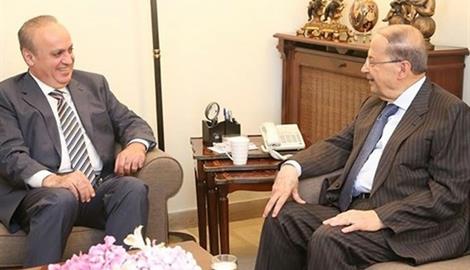An enticing non-offer/Unpacking Wiam Wahab’s strange opening
Michael Young/Now Lebanon/June 24/16
It’s not often that we hear from Tawhid Party leader Wiam Wahab these days, but something he said last week is worth examining. After meeting with Michel Aoun, Wahab did the customary thing and blamed Saad Hariri for the continued vacuum in the presidency, asking him to back Aoun.
But then Wahab said something else: “I assure Hariri from Rabieh today that Gen. Aoun possesses two keys: the first is the key to the presidency, and the second is the key to the premiership. Gen. Michel Aoun has a mandate from the political factions he is aligned with, specifically from Sayyed Hassan Nasrallah, to negotiate with Hariri for his return to the premiership, and he is the only one who has this authority.”
For the first time in a long time, we hear from someone close to Hezbollah, and quite clearly transmitting a message from the party, that Hariri may return as prime minister. The conventional wisdom until now has been that Hezbollah does not want a Hariri return because it prefers a fragmented Sunni community and doesn’t want the former prime minister to re-emerge as a unifying figure among the Sunnis. Wahab’s statement suggests that things may have changed.
Not so fast, the skeptical might reply. Wahab’s offer was really only two things: an effort to get Hezbollah off the hook for the continued delay in Aoun’s election; and an underhanded proposal that only seeks to ensure Hariri remains marginalized.
Indeed, since Samir Geagea supported Aoun for the presidency, all eyes have been turned to Hezbollah. If the party could persuade its ally Nabih Berri to back Aoun, his bloc’s votes in parliament, combined with those of the Aounists, the Lebanese Forces, Hezbollah and smaller parties aligned with Hezbollah, would give Aoun the two-thirds majority required to win.
Instead, in a speech last January, Nasrallah announced that, while he supported Aoun, he would not try to persuade his allies to back the general. In other words, having persuaded its allies to block a presidential vote for almost two years (at the time) by not going to parliament, Hezbollah would not seek to convince them to guarantee the victory of the man on whose behalf they had refused to attend electoral sessions in the first place.
It was perfectly logical as an argument, but only if one assumed that Hezbollah wanted to prolong the presidential vacuum. The Aounists are no fools and quickly saw through this. However, instead of confronting Hezbollah, they directed their rancor at Hariri, to better avoid a clash with the party. Wahab’s remarks, then, can be viewed as a further step in this direction.
What about the offer of a Hariri return? Again, the skeptics would point out that even if Hariri is named as prime minister after an Aoun election, this would only be temporary. With parliamentary elections looming soon afterward, Hariri would only be in office to organize those elections, as was Najib Mikati in 2005. After that all bets are off, and there are no guarantees that Hariri would return following parliamentary elections.
Perhaps, they’re right. And one thing that could determine this is the basis on which parliamentary elections are held? Hariri favors the 1960 law, which, despite his recent political setbacks, would allow him to retain a sizable bloc in parliament. That would help him in his efforts to come back as prime minister after the parliamentary elections, as prime ministers are chosen following a head count of the different parliamentary blocs.
However, the firm direction today, particularly among Christians, is to abandon the 1960 law, and Hezbollah has supported this by arguing for a proportional system. That is poison for Hariri, who knows that, given the results of the municipal elections, it would likely break his stranglehold on the Sunni community. Not surprisingly, all efforts in parliament to find a consensus around a new law have failed.
Berri has offered a way out of the impasse, proposing a “new Doha conference”—in other words a new package deal that would almost certainly aim to encompass an agreement over a president, a prime minister and an election law. However, the vagueness of Berri’s proposal, and the fact that many fear the Shiite parties will use it as a platform to propose constitutional amendments to their advantage, makes such an initiative deeply suspicious to the remnants of March 14.
So it would seem that we remain in a stalemate. That may be precisely what Hezbollah wants, but all the party has really done is exploit the clashing political agendas of the different political forces to produce such a situation. In light of this, Wahab’s remarks are probably destined to reinforce deadlock. But they also may provide a small opening that someone like Hariri can turn to his advantage if he operates with imagination.
For now, however, the former prime minister is wrestling with other dragons. His financial situation, already bad, is deteriorating by the day, while the repercussions of the municipal elections have yet to settle, with Hariri blaming those around him for his less than ideal performance. Hezbollah has its own problems to address, not least its failing campaign in Syria. Lebanon’s fate is a hostage to bad calculations all around.
**Michael Young is a writer and editor in Beirut. He tweets @BeirutCalling






















